Nursing Report: Analysis of Child's Psycho-social Development
VerifiedAdded on 2021/01/13
|7
|1851
|68
Report
AI Summary
This report analyzes the psycho-social development of a 2-year-old girl named Julie, who attends childcare, focusing on her toilet training and developmental milestones. The report delves into the key aspects of psycho-social development between the ages of two and five, encompassing physical, cognitive, emotional, language, and sensory-motor development. It references Erikson's stages of psychosocial development, Piaget's cognitive developmental theory, and behavioral child development theories to provide a comprehensive understanding of the child's progress. The report also addresses the concerns of Julie's mother regarding toilet training and suggests various strategies and support systems. Finally, the report emphasizes the significance of a nurturing environment, healthy habits, and parental support for the child's overall growth and well-being, including the importance of providing a structured schedule, encouraging social interaction, and setting clear expectations.
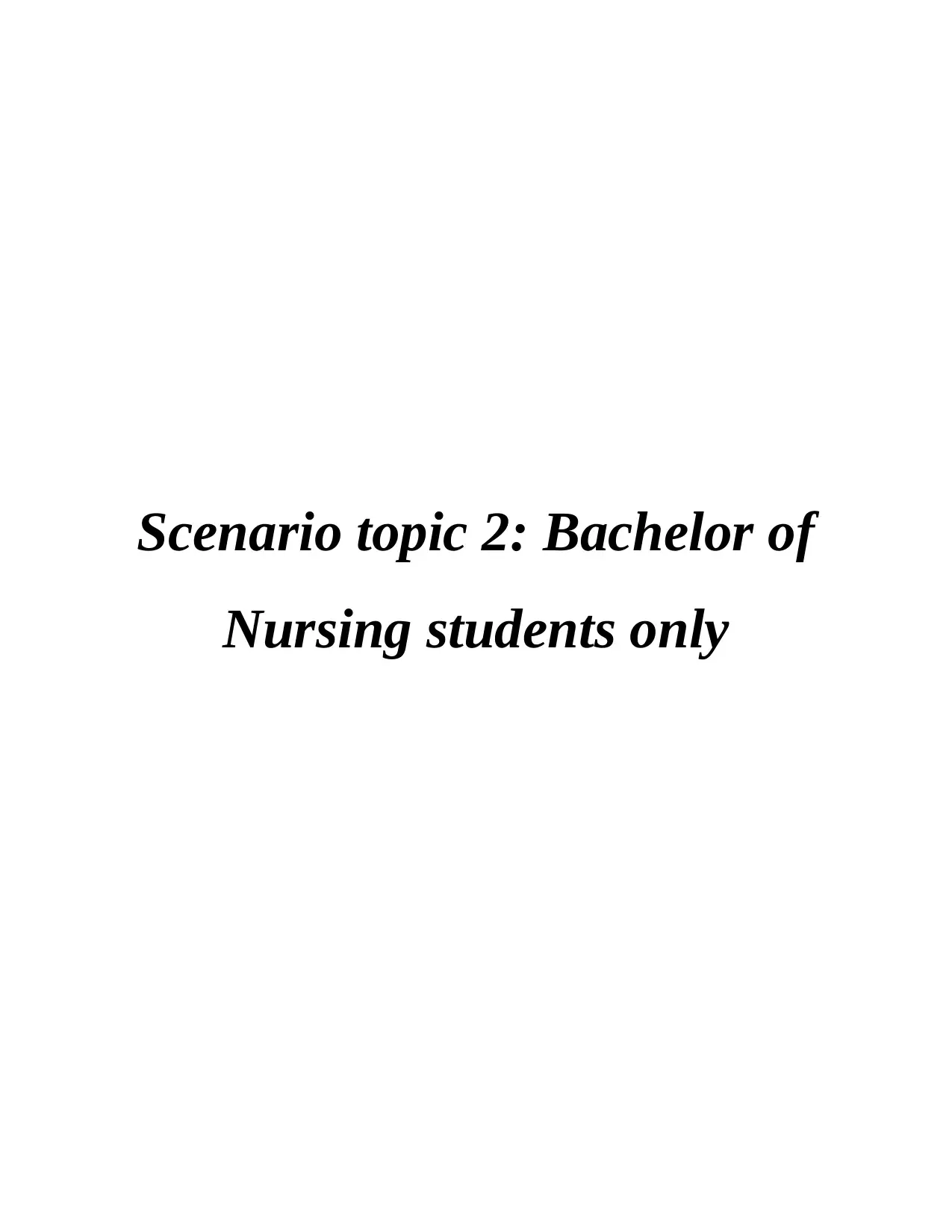
Scenario topic 2: Bachelor of
Nursing students only
Nursing students only
Paraphrase This Document
Need a fresh take? Get an instant paraphrase of this document with our AI Paraphraser
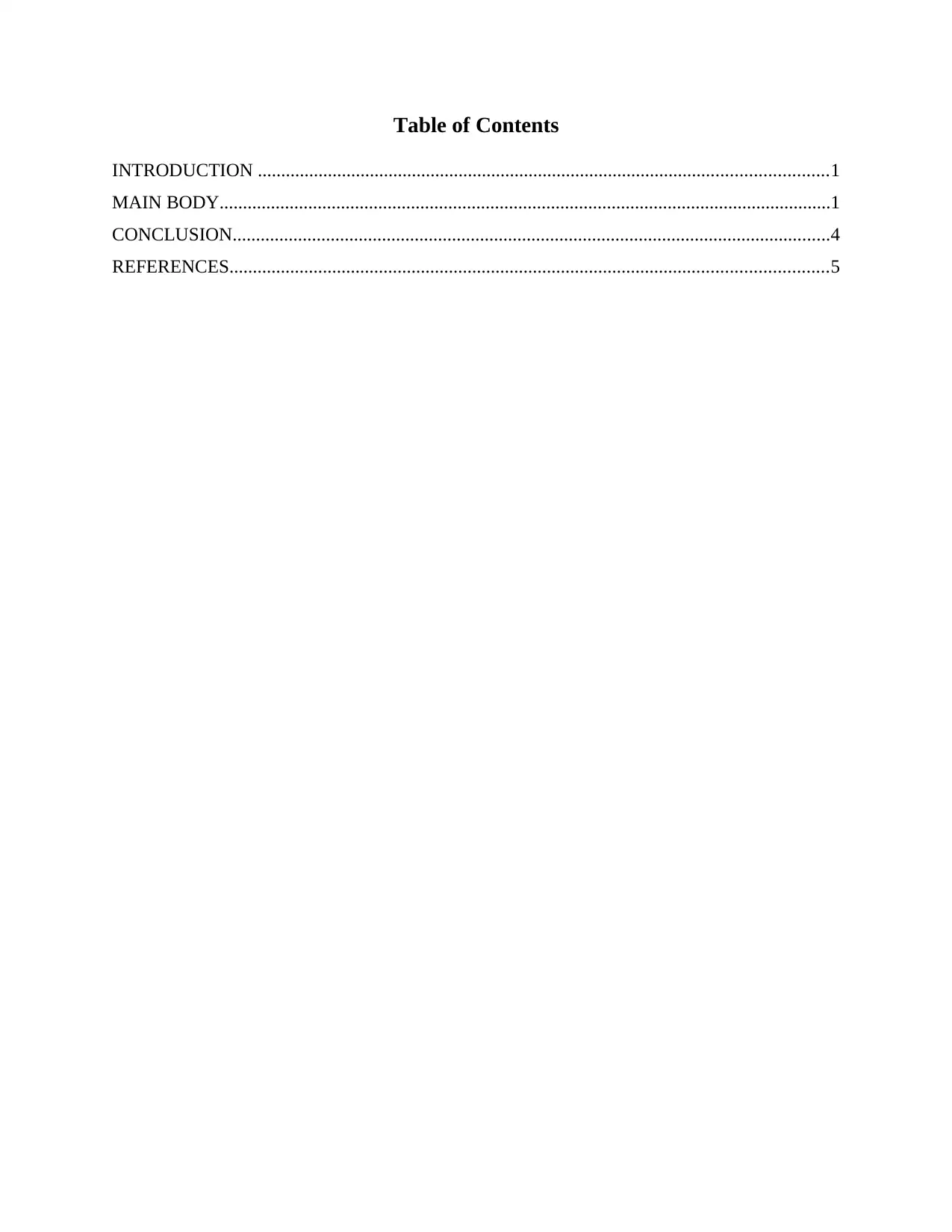
Table of Contents
INTRODUCTION ..........................................................................................................................1
MAIN BODY...................................................................................................................................1
CONCLUSION................................................................................................................................4
REFERENCES................................................................................................................................5
INTRODUCTION ..........................................................................................................................1
MAIN BODY...................................................................................................................................1
CONCLUSION................................................................................................................................4
REFERENCES................................................................................................................................5
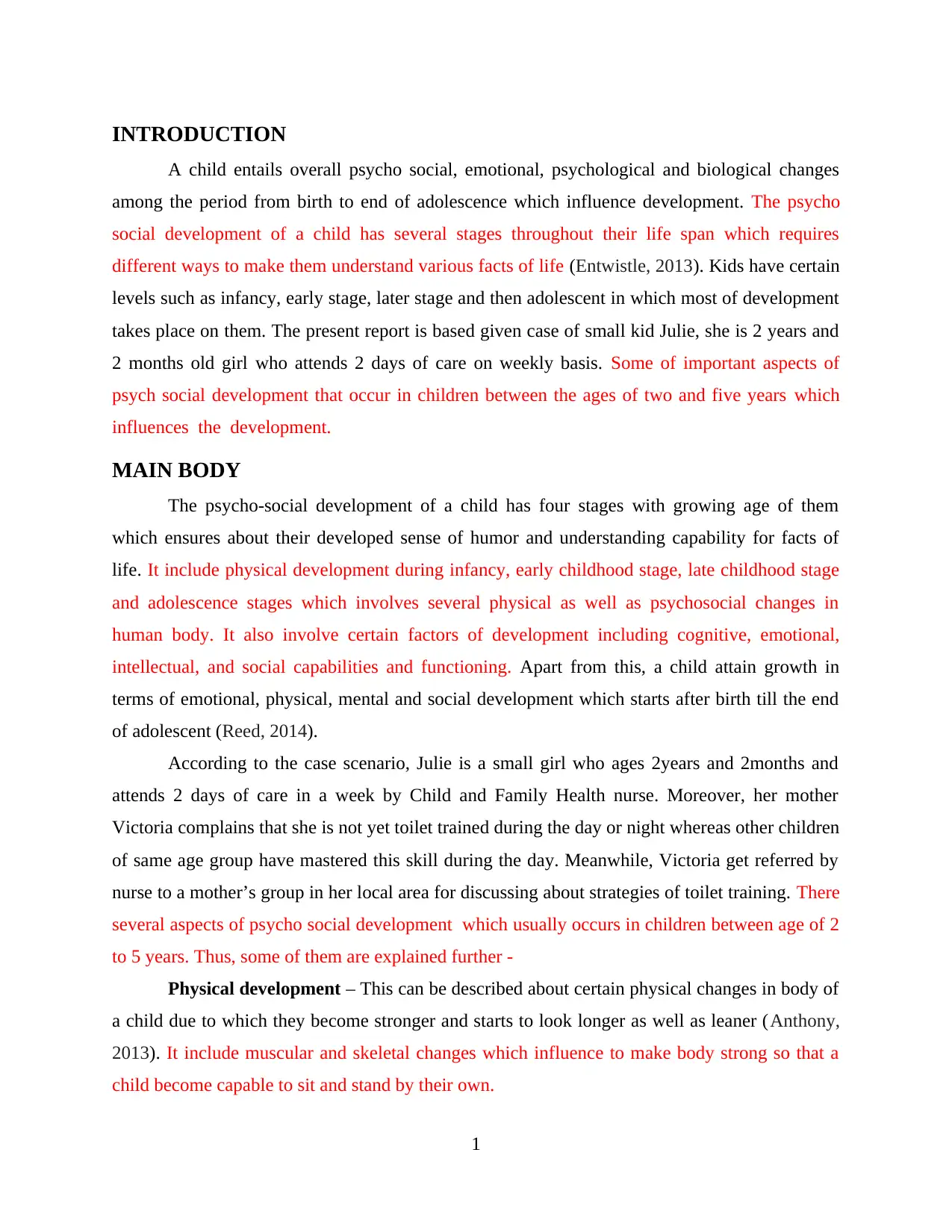
INTRODUCTION
A child entails overall psycho social, emotional, psychological and biological changes
among the period from birth to end of adolescence which influence development. The psycho
social development of a child has several stages throughout their life span which requires
different ways to make them understand various facts of life (Entwistle, 2013). Kids have certain
levels such as infancy, early stage, later stage and then adolescent in which most of development
takes place on them. The present report is based given case of small kid Julie, she is 2 years and
2 months old girl who attends 2 days of care on weekly basis. Some of important aspects of
psych social development that occur in children between the ages of two and five years which
influences the development.
MAIN BODY
The psycho-social development of a child has four stages with growing age of them
which ensures about their developed sense of humor and understanding capability for facts of
life. It include physical development during infancy, early childhood stage, late childhood stage
and adolescence stages which involves several physical as well as psychosocial changes in
human body. It also involve certain factors of development including cognitive, emotional,
intellectual, and social capabilities and functioning. Apart from this, a child attain growth in
terms of emotional, physical, mental and social development which starts after birth till the end
of adolescent (Reed, 2014).
According to the case scenario, Julie is a small girl who ages 2years and 2months and
attends 2 days of care in a week by Child and Family Health nurse. Moreover, her mother
Victoria complains that she is not yet toilet trained during the day or night whereas other children
of same age group have mastered this skill during the day. Meanwhile, Victoria get referred by
nurse to a mother’s group in her local area for discussing about strategies of toilet training. There
several aspects of psycho social development which usually occurs in children between age of 2
to 5 years. Thus, some of them are explained further -
Physical development – This can be described about certain physical changes in body of
a child due to which they become stronger and starts to look longer as well as leaner (Anthony,
2013). It include muscular and skeletal changes which influence to make body strong so that a
child become capable to sit and stand by their own.
1
A child entails overall psycho social, emotional, psychological and biological changes
among the period from birth to end of adolescence which influence development. The psycho
social development of a child has several stages throughout their life span which requires
different ways to make them understand various facts of life (Entwistle, 2013). Kids have certain
levels such as infancy, early stage, later stage and then adolescent in which most of development
takes place on them. The present report is based given case of small kid Julie, she is 2 years and
2 months old girl who attends 2 days of care on weekly basis. Some of important aspects of
psych social development that occur in children between the ages of two and five years which
influences the development.
MAIN BODY
The psycho-social development of a child has four stages with growing age of them
which ensures about their developed sense of humor and understanding capability for facts of
life. It include physical development during infancy, early childhood stage, late childhood stage
and adolescence stages which involves several physical as well as psychosocial changes in
human body. It also involve certain factors of development including cognitive, emotional,
intellectual, and social capabilities and functioning. Apart from this, a child attain growth in
terms of emotional, physical, mental and social development which starts after birth till the end
of adolescent (Reed, 2014).
According to the case scenario, Julie is a small girl who ages 2years and 2months and
attends 2 days of care in a week by Child and Family Health nurse. Moreover, her mother
Victoria complains that she is not yet toilet trained during the day or night whereas other children
of same age group have mastered this skill during the day. Meanwhile, Victoria get referred by
nurse to a mother’s group in her local area for discussing about strategies of toilet training. There
several aspects of psycho social development which usually occurs in children between age of 2
to 5 years. Thus, some of them are explained further -
Physical development – This can be described about certain physical changes in body of
a child due to which they become stronger and starts to look longer as well as leaner (Anthony,
2013). It include muscular and skeletal changes which influence to make body strong so that a
child become capable to sit and stand by their own.
1
⊘ This is a preview!⊘
Do you want full access?
Subscribe today to unlock all pages.

Trusted by 1+ million students worldwide
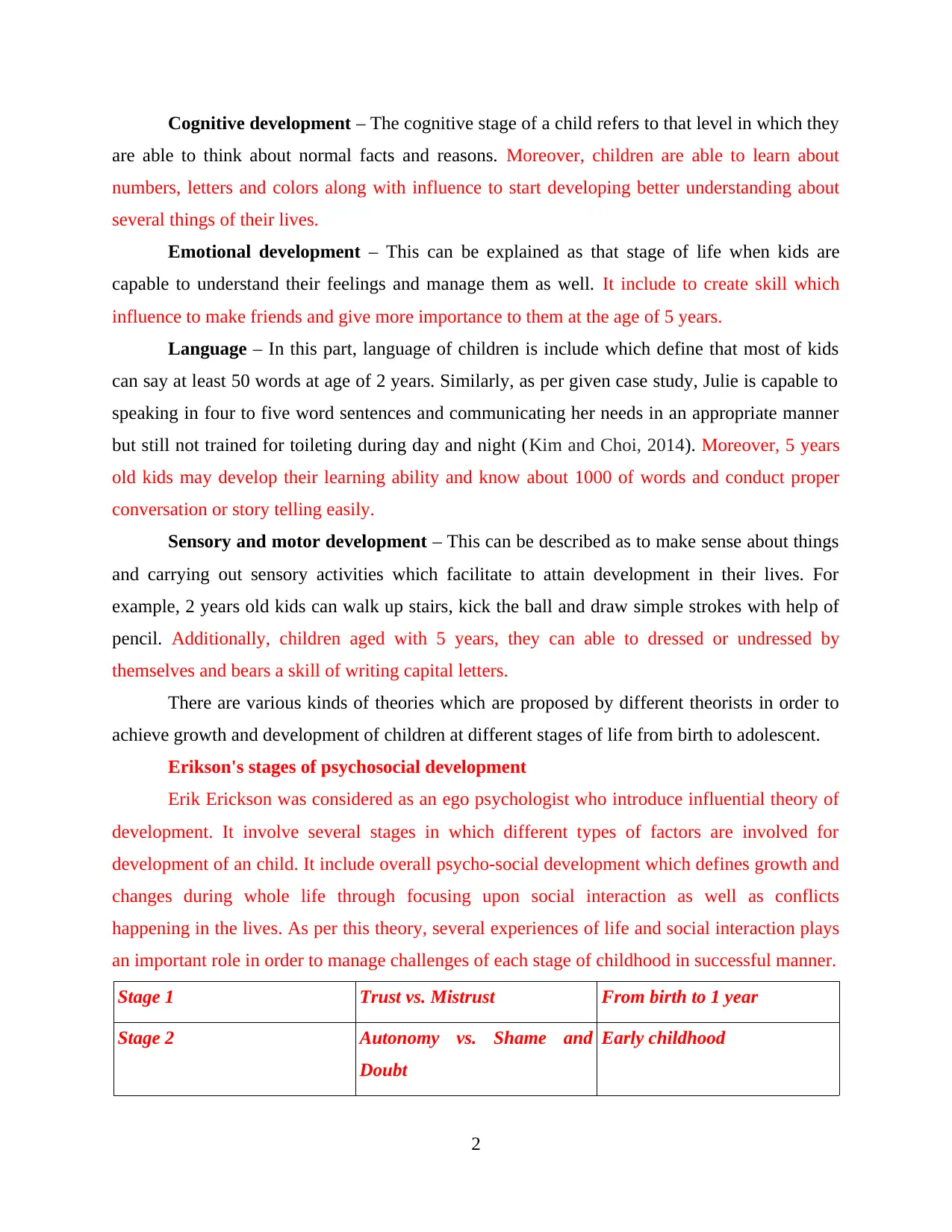
Cognitive development – The cognitive stage of a child refers to that level in which they
are able to think about normal facts and reasons. Moreover, children are able to learn about
numbers, letters and colors along with influence to start developing better understanding about
several things of their lives.
Emotional development – This can be explained as that stage of life when kids are
capable to understand their feelings and manage them as well. It include to create skill which
influence to make friends and give more importance to them at the age of 5 years.
Language – In this part, language of children is include which define that most of kids
can say at least 50 words at age of 2 years. Similarly, as per given case study, Julie is capable to
speaking in four to five word sentences and communicating her needs in an appropriate manner
but still not trained for toileting during day and night (Kim and Choi, 2014). Moreover, 5 years
old kids may develop their learning ability and know about 1000 of words and conduct proper
conversation or story telling easily.
Sensory and motor development – This can be described as to make sense about things
and carrying out sensory activities which facilitate to attain development in their lives. For
example, 2 years old kids can walk up stairs, kick the ball and draw simple strokes with help of
pencil. Additionally, children aged with 5 years, they can able to dressed or undressed by
themselves and bears a skill of writing capital letters.
There are various kinds of theories which are proposed by different theorists in order to
achieve growth and development of children at different stages of life from birth to adolescent.
Erikson's stages of psychosocial development
Erik Erickson was considered as an ego psychologist who introduce influential theory of
development. It involve several stages in which different types of factors are involved for
development of an child. It include overall psycho-social development which defines growth and
changes during whole life through focusing upon social interaction as well as conflicts
happening in the lives. As per this theory, several experiences of life and social interaction plays
an important role in order to manage challenges of each stage of childhood in successful manner.
Stage 1 Trust vs. Mistrust From birth to 1 year
Stage 2 Autonomy vs. Shame and
Doubt
Early childhood
2
are able to think about normal facts and reasons. Moreover, children are able to learn about
numbers, letters and colors along with influence to start developing better understanding about
several things of their lives.
Emotional development – This can be explained as that stage of life when kids are
capable to understand their feelings and manage them as well. It include to create skill which
influence to make friends and give more importance to them at the age of 5 years.
Language – In this part, language of children is include which define that most of kids
can say at least 50 words at age of 2 years. Similarly, as per given case study, Julie is capable to
speaking in four to five word sentences and communicating her needs in an appropriate manner
but still not trained for toileting during day and night (Kim and Choi, 2014). Moreover, 5 years
old kids may develop their learning ability and know about 1000 of words and conduct proper
conversation or story telling easily.
Sensory and motor development – This can be described as to make sense about things
and carrying out sensory activities which facilitate to attain development in their lives. For
example, 2 years old kids can walk up stairs, kick the ball and draw simple strokes with help of
pencil. Additionally, children aged with 5 years, they can able to dressed or undressed by
themselves and bears a skill of writing capital letters.
There are various kinds of theories which are proposed by different theorists in order to
achieve growth and development of children at different stages of life from birth to adolescent.
Erikson's stages of psychosocial development
Erik Erickson was considered as an ego psychologist who introduce influential theory of
development. It involve several stages in which different types of factors are involved for
development of an child. It include overall psycho-social development which defines growth and
changes during whole life through focusing upon social interaction as well as conflicts
happening in the lives. As per this theory, several experiences of life and social interaction plays
an important role in order to manage challenges of each stage of childhood in successful manner.
Stage 1 Trust vs. Mistrust From birth to 1 year
Stage 2 Autonomy vs. Shame and
Doubt
Early childhood
2
Paraphrase This Document
Need a fresh take? Get an instant paraphrase of this document with our AI Paraphraser
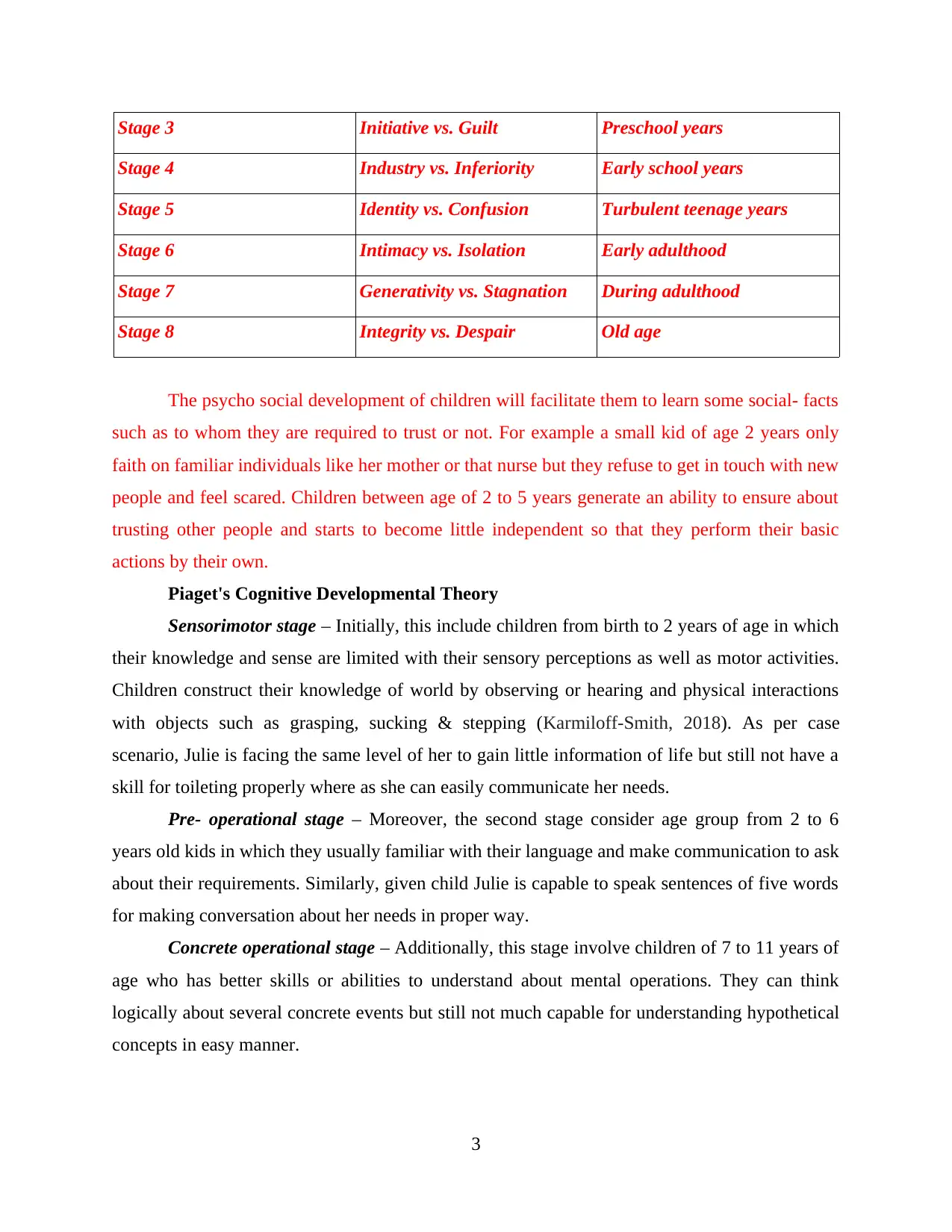
Stage 3 Initiative vs. Guilt Preschool years
Stage 4 Industry vs. Inferiority Early school years
Stage 5 Identity vs. Confusion Turbulent teenage years
Stage 6 Intimacy vs. Isolation Early adulthood
Stage 7 Generativity vs. Stagnation During adulthood
Stage 8 Integrity vs. Despair Old age
The psycho social development of children will facilitate them to learn some social- facts
such as to whom they are required to trust or not. For example a small kid of age 2 years only
faith on familiar individuals like her mother or that nurse but they refuse to get in touch with new
people and feel scared. Children between age of 2 to 5 years generate an ability to ensure about
trusting other people and starts to become little independent so that they perform their basic
actions by their own.
Piaget's Cognitive Developmental Theory
Sensorimotor stage – Initially, this include children from birth to 2 years of age in which
their knowledge and sense are limited with their sensory perceptions as well as motor activities.
Children construct their knowledge of world by observing or hearing and physical interactions
with objects such as grasping, sucking & stepping (Karmiloff-Smith, 2018). As per case
scenario, Julie is facing the same level of her to gain little information of life but still not have a
skill for toileting properly where as she can easily communicate her needs.
Pre- operational stage – Moreover, the second stage consider age group from 2 to 6
years old kids in which they usually familiar with their language and make communication to ask
about their requirements. Similarly, given child Julie is capable to speak sentences of five words
for making conversation about her needs in proper way.
Concrete operational stage – Additionally, this stage involve children of 7 to 11 years of
age who has better skills or abilities to understand about mental operations. They can think
logically about several concrete events but still not much capable for understanding hypothetical
concepts in easy manner.
3
Stage 4 Industry vs. Inferiority Early school years
Stage 5 Identity vs. Confusion Turbulent teenage years
Stage 6 Intimacy vs. Isolation Early adulthood
Stage 7 Generativity vs. Stagnation During adulthood
Stage 8 Integrity vs. Despair Old age
The psycho social development of children will facilitate them to learn some social- facts
such as to whom they are required to trust or not. For example a small kid of age 2 years only
faith on familiar individuals like her mother or that nurse but they refuse to get in touch with new
people and feel scared. Children between age of 2 to 5 years generate an ability to ensure about
trusting other people and starts to become little independent so that they perform their basic
actions by their own.
Piaget's Cognitive Developmental Theory
Sensorimotor stage – Initially, this include children from birth to 2 years of age in which
their knowledge and sense are limited with their sensory perceptions as well as motor activities.
Children construct their knowledge of world by observing or hearing and physical interactions
with objects such as grasping, sucking & stepping (Karmiloff-Smith, 2018). As per case
scenario, Julie is facing the same level of her to gain little information of life but still not have a
skill for toileting properly where as she can easily communicate her needs.
Pre- operational stage – Moreover, the second stage consider age group from 2 to 6
years old kids in which they usually familiar with their language and make communication to ask
about their requirements. Similarly, given child Julie is capable to speak sentences of five words
for making conversation about her needs in proper way.
Concrete operational stage – Additionally, this stage involve children of 7 to 11 years of
age who has better skills or abilities to understand about mental operations. They can think
logically about several concrete events but still not much capable for understanding hypothetical
concepts in easy manner.
3
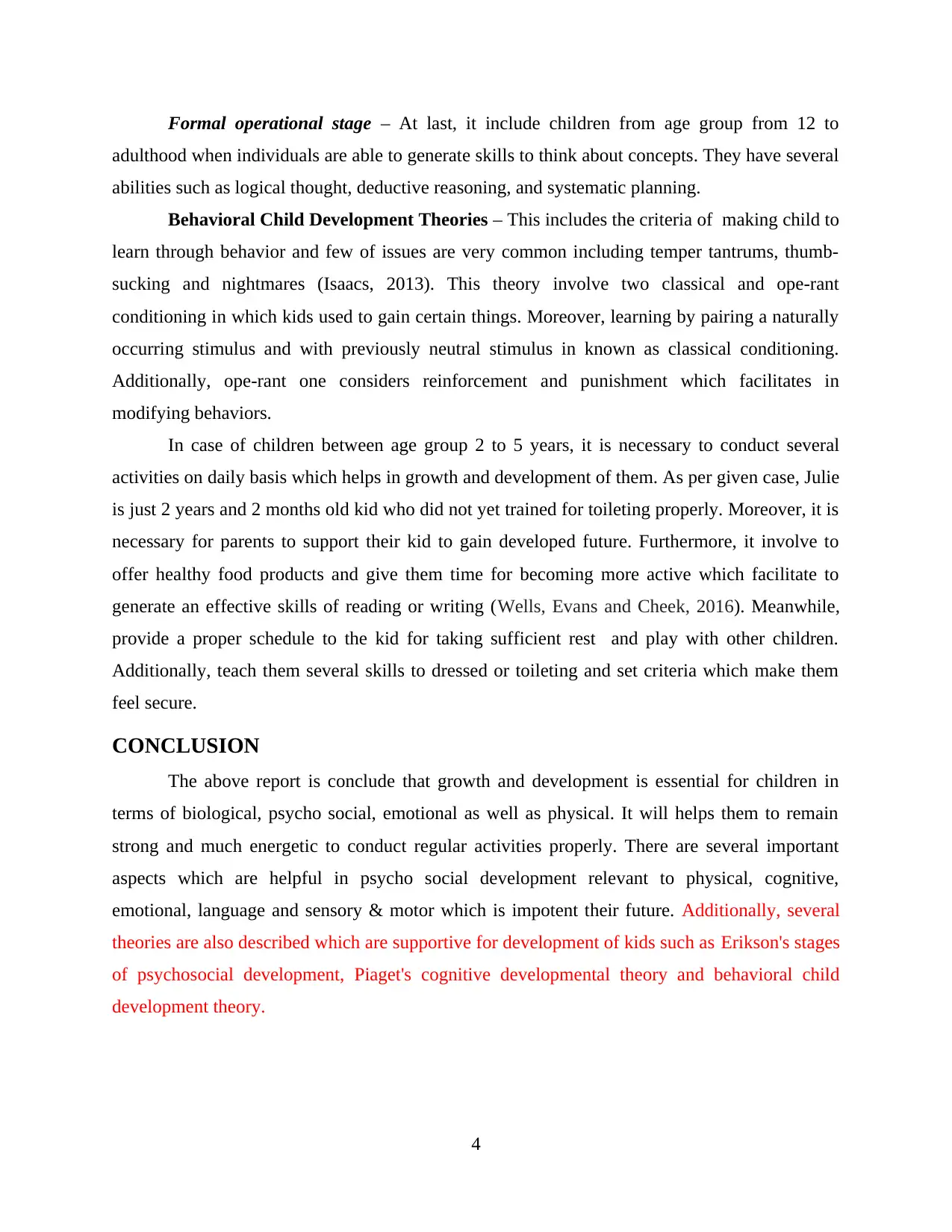
Formal operational stage – At last, it include children from age group from 12 to
adulthood when individuals are able to generate skills to think about concepts. They have several
abilities such as logical thought, deductive reasoning, and systematic planning.
Behavioral Child Development Theories – This includes the criteria of making child to
learn through behavior and few of issues are very common including temper tantrums, thumb-
sucking and nightmares (Isaacs, 2013). This theory involve two classical and ope-rant
conditioning in which kids used to gain certain things. Moreover, learning by pairing a naturally
occurring stimulus and with previously neutral stimulus in known as classical conditioning.
Additionally, ope-rant one considers reinforcement and punishment which facilitates in
modifying behaviors.
In case of children between age group 2 to 5 years, it is necessary to conduct several
activities on daily basis which helps in growth and development of them. As per given case, Julie
is just 2 years and 2 months old kid who did not yet trained for toileting properly. Moreover, it is
necessary for parents to support their kid to gain developed future. Furthermore, it involve to
offer healthy food products and give them time for becoming more active which facilitate to
generate an effective skills of reading or writing (Wells, Evans and Cheek, 2016). Meanwhile,
provide a proper schedule to the kid for taking sufficient rest and play with other children.
Additionally, teach them several skills to dressed or toileting and set criteria which make them
feel secure.
CONCLUSION
The above report is conclude that growth and development is essential for children in
terms of biological, psycho social, emotional as well as physical. It will helps them to remain
strong and much energetic to conduct regular activities properly. There are several important
aspects which are helpful in psycho social development relevant to physical, cognitive,
emotional, language and sensory & motor which is impotent their future. Additionally, several
theories are also described which are supportive for development of kids such as Erikson's stages
of psychosocial development, Piaget's cognitive developmental theory and behavioral child
development theory.
4
adulthood when individuals are able to generate skills to think about concepts. They have several
abilities such as logical thought, deductive reasoning, and systematic planning.
Behavioral Child Development Theories – This includes the criteria of making child to
learn through behavior and few of issues are very common including temper tantrums, thumb-
sucking and nightmares (Isaacs, 2013). This theory involve two classical and ope-rant
conditioning in which kids used to gain certain things. Moreover, learning by pairing a naturally
occurring stimulus and with previously neutral stimulus in known as classical conditioning.
Additionally, ope-rant one considers reinforcement and punishment which facilitates in
modifying behaviors.
In case of children between age group 2 to 5 years, it is necessary to conduct several
activities on daily basis which helps in growth and development of them. As per given case, Julie
is just 2 years and 2 months old kid who did not yet trained for toileting properly. Moreover, it is
necessary for parents to support their kid to gain developed future. Furthermore, it involve to
offer healthy food products and give them time for becoming more active which facilitate to
generate an effective skills of reading or writing (Wells, Evans and Cheek, 2016). Meanwhile,
provide a proper schedule to the kid for taking sufficient rest and play with other children.
Additionally, teach them several skills to dressed or toileting and set criteria which make them
feel secure.
CONCLUSION
The above report is conclude that growth and development is essential for children in
terms of biological, psycho social, emotional as well as physical. It will helps them to remain
strong and much energetic to conduct regular activities properly. There are several important
aspects which are helpful in psycho social development relevant to physical, cognitive,
emotional, language and sensory & motor which is impotent their future. Additionally, several
theories are also described which are supportive for development of kids such as Erikson's stages
of psychosocial development, Piaget's cognitive developmental theory and behavioral child
development theory.
4
⊘ This is a preview!⊘
Do you want full access?
Subscribe today to unlock all pages.

Trusted by 1+ million students worldwide

5
1 out of 7
Related Documents
Your All-in-One AI-Powered Toolkit for Academic Success.
+13062052269
info@desklib.com
Available 24*7 on WhatsApp / Email
![[object Object]](/_next/static/media/star-bottom.7253800d.svg)
Unlock your academic potential
Copyright © 2020–2026 A2Z Services. All Rights Reserved. Developed and managed by ZUCOL.




